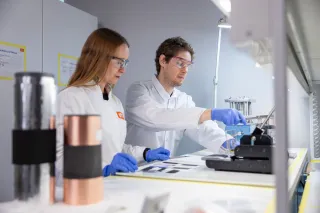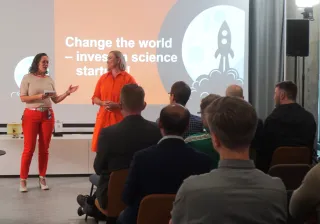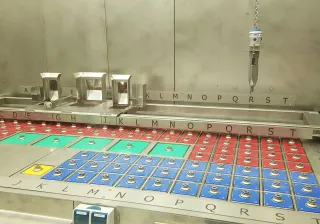As society places higher emphasis on environmental stewardship and reduction of waste streams, it is also important that the nuclear community takes efficient management of waste streams as a top priority. In addition, as more legacy waste sites are being cleaned and the nuclear power plant fleet of Europe moves towards decommissioning, there are greater volumes of radioactive wastes to process prior to permanent geological disposal.
The project “PREDIS: Pre-Disposal Management of Radioactive Waste” develops and improves safer treatment and conditioning methodologies and processes for wastes, for which no adequate or industrially mature solutions are currently available. The project addresses innovation and break-through technologies for better handling of low-level and intermediate level radioactive wastes, with a focus on treatment of metallic materials, liquid organic waste and solid organic waste which can result from nuclear power plant operation, decommissioning and other industrial processes. The project also addresses digitalization solutions for improved safety and efficiency in handling and assessing cemented-waste packages in extended interim surface storage. An example of this is digital twins and the use of artificial intelligence for big data mining from non-destructive evaluation methods. Through all of these pre-disposal treatment activities, waste acceptance criteria are a critical parameter for optimizing the safe and efficient handling and minimisation of wastes over the whole life cycle, from cradle to grave.
PREDIS will produce tools guiding decision-making on the added-value of the developed technologies and their impact on the design, safety, environmental impact and economics of pre-disposal waste management and future disposal. It is anticipated that the project results are close to implementation by the end user community, which is ensured through their active involvement with the partners and the co-funding structure of this EC project. The project’s Strategic Research Agenda will highlight needs for future technology development, investments and needs also from the perspectives of competence development and preservation of knowledge.
“This project aims at achieving what individual companies and countries cannot do alone, and bringing these solutions to a wider, pan-European audience”, says Project Coordinator Maria Oksa of VTT Technical Research Centre of Finland. With 47 partners from 17 countries across Europe, the 4-year, 24 million euro project, which started 1 September 2020, should make great strides in the best practices and new technologies ready for global markets. Erika Holt, co-coordinator at VTT adds that “We strive to gather inputs from a wide range of actors who have needs for these technologies, are ready to be involved in our project demonstrations, and can later rapidly deploy the results.”
The PREDIS project will hold a public session open to all interested stakeholders on 21 October 2020 from 13-17.30 CET. Participation is free of charge and registration can be done via the project’s web page predis-h2020.eu. Interested parties are also encouraged to sign-up via the project’s web page for future event invites, including the periodic newsletter and upcoming free webinars on innovation in waste treatment.
Consortium
Coordinator: VTT Technical Research Centre of Finland - Coordinator ( Finland)
Work-package leaders: National Nuclear Laboratory (UK), Joint Research Centre (Belgium), Institut Mines Télécom Nantes Atlantique (France), CEA (France), SCK CEN (Belgium), BAM (Germany)
Partners: Magics Instruments (Belgium), Technical University Sofia (Bulgaria), CTU (CZ), CVRez (CZ), SÚRO (CZ) ÚJV Rez (CZ), University of Helsinki (Finland), CNRS (France), Ecole Centrale de Lille (France), IRSN (France), ORANO Cycle (France), DMT (Germany), Forshungszentrum Julich (Germany), Karlsruher Institut Fuer Technologie (Germany), National Center for Scientific Research "Demokritos" (Greece), Isotoptech (Hungary), Radiookologiai Tisztasagert Tarsadalmi Szervezet (Hungary), TS Enercon (Hungary), Ansaldo Nucleare (Italy), ENEA (Italy), INFN (Italy), Nucleco (Italy), Politecnico di Milano (Italy), SOGIN (Italy), University of Pisa (Italy), FTMC (Lithuania), NRG (Netherlands), IFE (Norway), RATEN (Romania), Amphos 21 (Spain), CIEMAT (Spain), CSIC (Spain), ENRESA (Spain), Universidad Autónoma de Madrid (Spain), Paul Scherrer Institut (Switzerland), Galson Sciences Limited (UK ), University of Manchester (UK), University of Sheffield (UK), National Science Centre Kharkov Institute of Physics and Technology (Ukraine), Institute of Environmental Geochemistry, National Academy of Science of Ukraine (Ukraine)
The project is receiving funding from the European Union’s Horizon 2020 research and innovation programme under grant agreement No 945098 (2020-2024).






